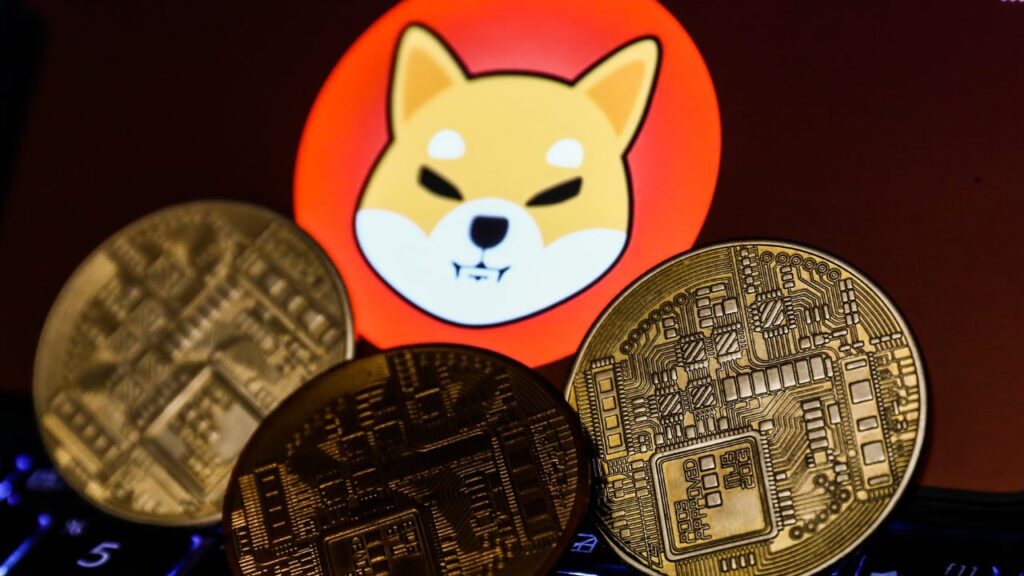With only about 34 days left until the Bitcoin halving event, which will slash the Bitcoin issuance rate by half, there’s a buzz in the cryptocurrency market.
Basile Maire, D8X co-founder and former UBS executive director, in an interview with Cointelegraph, emphasized the significant impact this event could have on supply and demand dynamics.
He said, “There seems to be more demand and less supply, so according to the old economic rules, prices have to move up.
“So the question now: is the [Bitcoin halving] priced in? Probably not to the full extent.”
‘This anticipated event is set against the backdrop of Bitcoin’s price surging past $71,000 for the first time on March 11, signaling robust market optimism.
This bullish sentiment is further echoed in the Bitcoin futures market, where expectations are steering towards a remarkable climb to the $100,000 mark by May.
Maire detailed, “The option data says that people expect Bitcoin price to be in the range of $80,000 to $100,000.
READ MORE: Web 3.0 Gaming: Taki Games Set to Launch Genopets Match in April
“For instance, in May, there was quite a spike in open interest for $100,000. While it’s not a big volume [spike]. I still think this means something.”
Adding to the fervor is the upcoming U.S. presidential election, seen by Maire as a potential positive catalyst for the crypto market.
He believes measures to stabilize traditional markets will inadvertently benefit cryptocurrencies, especially with the enhanced linkage through ETFs.
The surge in Bitcoin’s value has also been partly attributed to the inflows from U.S. spot Bitcoin exchange-traded funds (ETFs), as noted by Sergei Gorev, a risk manager at YouHodler.
He highlighted the significant daily purchases by these ETFs, stating, “Spot Bitcoin ETFs buy 10 times more Bitcoin daily than miners produce each day.”
With a total on-chain holding of $60.5 billion as of March 13, and based on recent trends, Bitcoin ETFs are on track to absorb a substantial portion of the BTC supply annually, per Dune data, further underscoring the growing mainstream acceptance and investment in Bitcoin ahead of the halving event.
To submit a crypto press release (PR), send an email to sales@cryptointelligence.co.uk.
Binance, the leading crypto exchange in terms of market share, is capitalizing on the current enthusiasm for meme coins by launching a new promotion focused on popular crypto tokens such as Shiba Inu (SHIB), Dogecoin (DOGE), and Dogwifhat (WIF).
Announced recently, this promotion offers users who borrow selected meme coins on Binance Margin—including DOGE, SHIB, WIF, PEPE, FLOKI, BONK, and MEME—a waiver on interest fees for the first hour.
This incentive is available from March 12 to March 26, targeting the seven largest meme coins by market cap.
The mechanism behind the promotion is straightforward: interest accrues hourly, but traders can avoid any charges by repaying within the first hour of borrowing.
This strategy aligns with Binance’s broader goal to leverage the surging interest in meme coins, which have been at the forefront of the current bull cycle’s narrative.
The exchange aims to attract more users to trade these tokens by utilizing their popularity.
In addition to this promotion, Binance has expanded its offerings in the meme coin sector.
It has introduced WIF for spot trading and listed MYRO, a Solana-based meme coin, for futures trading.
READ MORE: Pepe Coin Surges to New Heights, Joining Bitcoin and Ether in Crypto Rally
Additionally, a PEPE/USDC trading pair has been added, complementing the existing PEPE/USDT pair, as part of efforts to appeal to meme coin traders.
The exchange is not just focusing on meme coins but also on the Game-Fi sector, acknowledging its potential in the upcoming bull cycle.
The interest fee waiver also covers gaming tokens such as PORTAL, GALA, BNX, YGG, and PIXEL, indicating Binance’s recognition of diverse investment narratives.
The increased interest in meme coins, particularly SHIB, is evident across the crypto trading platform landscape.
NewsBTC highlighted that platforms like Robinhood and Crypto.com have significantly increased their SHIB holdings, responding to the growing demand from traders.
SHIB’s popularity is further underscored by a reported 20-fold increase in daily new addresses in March compared to February and a new all-time high in the Total Value Locked (TVL) of its layer-2 network, Shibarium.
At the moment, SHIB’s price has seen an uptick in the last 24 hours, trading at approximately $0.00003318 according to CoinMarketCap data, reflecting the broader interest in this meme coin and its ecosystem.
To submit a crypto press release (PR), send an email to sales@cryptointelligence.co.uk.
Binance, a leading cryptocurrency exchange, has declared its intention to remove several trading pairs involving TrueUSD (TUSD), a stablecoin with connections to Justin Sun, the founder of Tron.
On March 13, the exchange issued a statement announcing the forthcoming delisting of COMP/TUSD, EDU/TUSD, and PENDLE/TUSD pairs.
Additionally, BNB pairs with Arpa and EduCoin will also be discontinued. These changes are set to take effect on March 15, 2024, at 3:00 am UTC.
The decision to delist these pairs stems from Binance’s routine evaluation process, aimed at safeguarding users and ensuring the integrity of the trading environment.
The exchange pointed out that factors leading to the delisting of spot trading pairs could include inadequate liquidity and trading volume.
Nevertheless, Binance clarified the delisting’s implications, stating, “The delisting of a spot trading pair does not affect the availability of the tokens on Binance Spot.
“Users can still trade the spot trading pair’s base and quote assets on other trading pair(s) that are available on Binance.”
READ MORE: Starknet to Harness Ethereum’s Dencun Upgrade for Major Fee Reductions and Enhanced Scalability
“This ensures that TUSD remains accessible on the platform through its other trading pairs with major cryptocurrencies like Bitcoin, Cardano, Avalanche, and Bitcoin Cash.
In addition to removing specific trading pairs, Binance also announced the discontinuation of spot trading bot services for these pairs, effective concurrently with the delisting.
The platform advised users to adjust or terminate their bots by the deadline to prevent potential financial losses.
TUSD has encountered several challenges since late 2023. A significant security breach was reported on October 17, when a third-party service provider was compromised, leading to a potential exposure of user KYC and transaction data.
Moreover, the stablecoin’s stability was tested earlier this year when it deviated from its $1 peg.
On January 15, TUSD’s value dipped to $0.984 as a result of traders liquidating over $339 million in TUSD for Tether, following speculation about the token’s absence from Binance’s Manta launch pool initiative.
To submit a crypto press release (PR), send an email to sales@cryptointelligence.co.uk.
Taki Games, a prominent social gaming network known for offering real money rewards to its users, is expanding its horizons by partnering with Genopets. This collaboration aims to extend the “move-to-earn” concept, a rapidly growing brand within the Solana blockchain ecosystem that has attracted a large player base.
Set to launch in April 2024, Genopets Match will join an expanding lineup of Web3-branded games on Taki’s Solana-based platform, such as Puzzle Smoofs, Game7 Food Fighter, and Pac-Cats. Through this partnership, Taki Games aspires to introduce billions of mobile gamers to Web3, enhancing the gaming experience with rewarding opportunities by collaborating with numerous top Web3 brands and communities.
Taki Games’ decentralized network revolutionizes mobile gaming by incorporating tokenized rewards and ownership of gaming assets, fostering a player-owned ecosystem. This approach not only offers developers new revenue avenues but also allows them to share success with their players. As a pioneer in the “play-to-earn” (P2E) gaming trend, Taki Games seeks to refine the model with a tokenomics structure designed to prevent token hyperinflation. This strategy aims to ensure players receive a fair portion of the over $200 billion annually generated by the gaming industry.
Central to Taki’s model is the TAKI token, featuring a “buy-and-burn” mechanism to sustain its value while motivating gamers to engage and earn. The developer team behind Taki includes the founders of Kabam, a leading studio in the free-to-play mobile and social gaming sector.
Genopets stands out in the Solana blockchain ecosystem as a top free-to-play mobile game with a vast active player base. The game, reminiscent of classics like Pokemon and Tamagotchi, involves nurturing NFT-based digital pets. It offers extensive customization and evolution options for the Genopets, adding depth and variety to the gameplay. Ahead of its public V1 launch, Genopets is integrating with Taki’s network to broaden its audience, encouraging new users to join through a special airdrop.
Both Taki and Genopets are committed to mainstreaming the Web3 industry, attracting a diverse audience including Solana token holders, NFT enthusiasts, and digital asset collectors. Jay Chang of Genopets expressed excitement about partnering with Taki Games to introduce mainstream gamers to the next generation of Web3 gaming.
This partnership marks a significant milestone in Taki Games’ journey, which has seen a 3,000% network growth since its pivot to Web3 gaming. Now ranked among the top dApps in the Polygon Proof-of-Stake ecosystem and across all blockchain networks, Taki’s success is evident in its native TAKI token’s trading volume and the widespread adoption of its mobile gaming app. Taki Games CEO Weiwei Geng envisions the company as Web3’s Zynga, aiming to drive mainstream adoption of Web3 through engaging gaming experiences and ownership opportunities.
This collaboration between Taki Games and Genopets illustrates the transformative potential of Web3 technologies in redefining traditional video game engagement and growth, promising a new era of enhanced value and opportunities for developers and gamers alike.
Relai, a Swiss-based Bitcoin-only application, has announced an exciting development for its users – the integration of Blockstream’s Greenlight solution, which will introduce Lightning payment functionality to the platform.
This collaboration aims to enhance the Bitcoin payment experience for Relai’s user base, according to a detailed announcement provided to Cointelegraph.
Blockstream’s Lightning-as-a-service offering is being woven into the fabric of Relai’s dedicated Bitcoin wallet platform.
This integration is poised to empower approximately 100,000 Relai users with the ability to conduct Bitcoin (BTC) transactions swiftly and affordably via the Lightning Network, all the while retaining control over their private keys.
Importantly, this move allows Relai to bypass the need for creating and managing its own Lightning infrastructure.
The inception of Greenlight by Blockstream in June 2023 marked a significant stride toward facilitating rapid, cost-effective Bitcoin payments for developers and platforms, emphasizing user sovereignty over private keys.
Traditional custodial solutions, while convenient and quick to set up, often compromise user security and privacy.
In contrast, noncustodial services, which prioritize these aspects, typically demand extensive technical and operational input.
Greenlight’s novel approach divides custodial Lightning nodes into distinct, independently functioning components.
READ MORE: Arbitrum to Release $2.32 Billion in Vested Tokens, Sparking Market Speculation
It utilizes Core Lightning for its foundational structure, enabling all operations related to private keys to be executed on the user’s device, effectively making it the signer.
The rest, including operational requirements, are managed on Blockstream’s infrastructure.
This infrastructure is grounded in the Validating Lightning Signer project, ensuring thorough verification and safeguarding user autonomy over fund-related operations.
It mirrors the architecture of hardware wallets, which combine a user-operated client interface and signer with the wallet provider’s Bitcoin node that connects to the broader network.
This setup facilitates payment initiation and invoice signing by the user, with Blockstream managing the node responsibilities.
Founded in 2020, Relai has exclusively focused on Bitcoin trading and custody, boasting over $300 million in trading volume in its four-year history.
The platform’s pivot towards Lightning payments follows broader industry trends, with leading exchanges, including Coinbase, enhancing their Bitcoin transaction capabilities.
In September 2023, Coinbase, the largest U.S. exchange, announced its plan to adopt Bitcoin Lightning payments, underscoring Bitcoin’s pivotal role in the cryptocurrency ecosystem and its potential to enable quicker, more economical BTC transactions, as highlighted by CEO Brian Armstrong.
To submit a crypto press release (PR), send an email to sales@cryptointelligence.co.uk.
Zap Protocol’s ZAP token has breached the $0.01 mark after surging 42% in the last 24 hours, according to CoinMarketCap data.
This comes just hours after Crypto Intelligence News predicted ZAP, which was trading around $0.007 at the time, to surge over $0.01 within “the coming days or even just hours.”
Looking ahead, ZAP token is well positioned to rally as high as the $0.02-$0.03 mark before the end of March, with a medium-term price target of between $0.20 and $0.45.
Zap Protocol now has a market cap of around $2.4 million, and the token is still more than 100x away from its all-time high, leaving it with plenty of room for growth amid the current bull market.
Bitcoin (BTC), meanwhile is up by around 3.2% over the last 24 hours, currently trading at slightly over $73,200.
The world’s largest cryptocurrency has been rallying as a result of high demand for the recently approved spot Bitcoin ETFs, and the BTC price has increased by over 9% in the last 7 days.
This has propelled the broader cryptocurrency market, with Shiba Inu (SHIB) posting strong gains in the first week of March, but trading sideways in recent days.
Over the last 24 hours, SHIB is up by 1.6%, according to CoinMarketCap data.
SHIB still has lots of upside potential, but with a market cap of $18.8 billion, it will take significant inflows for Shiba Inu’s price to generate a high double-digit increase.
This month, Shiba Inu (SHIB) has seen a significant resurgence, capturing the attention of cryptocurrency enthusiasts with a 250% increase in value over just two weeks.
This rally recalls the meteoric rise of SHIB in October 2021 when it reached its peak at $0.00008845.
Crypto analyst Alan Santana has made a striking prediction on TradingView about SHIB’s trajectory, foreseeing an 822% price surge.
Santana’s analysis points to a breakout potential for SHIB, suggesting that its current price could be just the beginning of a substantial upward movement.
If SHIB follows Santana’s projection, its value could soar to a new all-time high of $0.00027, marking a significant milestone for the cryptocurrency.
Santana outlined several intermediate targets for SHIB, with prices ranging from $0.00000888 to $0.00001890, and recommended a buying range of $0.00000742 to $0.00000824.
READ MORE: MicroStrategy Bolsters Bitcoin Treasury With $800 Million Note Offering, Purchases 12,000 BTC
Despite SHIB having already surpassed these levels, Santana believes now is the opportune time to invest, as the currency aims for the $0.00027 mark, a target that surpasses predictions by other analysts.
It’s important to note that Santana’s forecast is intended for long-term investors, cautioning those looking for quick profits to tread carefully.
He emphasizes the importance of timing and patience for those engaged in leverage trading.
Currently, SHIB has experienced a minor downturn, with a 6% decrease in the last 24 hours and a 17% drop over the past week.
Despite trading 62.42% below its all-time high, according to CoinMarketCap data, the recent performance has reignited optimism for reaching new highs.
The Shiba Inu ecosystem, including developments like Shibarium, and bullish chart signals contribute to the positive outlook for SHIB.
These factors, combined with the current momentum, suggest that a new all-time high for SHIB might not be far off, offering promising prospects for the meme coin and its investors.
To submit a crypto press release (PR), send an email to sales@cryptointelligence.co.uk.
Two prominent voices within the crypto community have recently made a call to action for their followers on X, emphasizing the urgency of acquiring Bitcoin, gold, and silver in the face of escalating U.S. national debt.
On March 11, Balaji Srinivasan, an entrepreneur and angel investor, took to X to express his view that Bitcoin represents a critical solution to counteract the challenges posed by rampant government expenditure and the threat of asset confiscation.
Highlighting the severity of the situation, Srinivasan, with nearly a million followers and a background as Coinbase’s former CTO, painted a grim picture of the current economic landscape, likening it to the decline of empires past due to treasury looting.
He pointed out the alarming growth in government debt, noting a 25% increase since 2020, bringing the total to a staggering $34.5 trillion.
Srinivasan, who also serves as a general partner at venture capital firm Andreessen Horowitz (a16z), outlined possible responses to this crisis.
These range from denial to attempting political solutions or succumbing to apathy.
However, he advocates for a more radical approach: leveraging Bitcoin to “starve the beast,” thereby limiting the government’s ability to confiscate or inflate currency.
He highlighted the current daily deficit spending of $10 billion as a sign of escalating problems.
READ MORE: Grayscale and Coinbase Meet with SEC to Push for Spot Ether ETFs
Echoing Srinivasan’s concerns, Robert Kiyosaki, author of “Rich Dad Poor Dad,” also advised on the importance of readiness, recommending investment in assets like Bitcoin for their value preservation qualities.
Kiyosaki’s post referenced the rapid increase in national debt, painting a bleak picture of America’s financial health.
Furthermore, Srinivasan warned of potential aggressive actions by a financially desperate state, such as asset confiscation.
He cited various international and domestic precedents where governments have taken control of private assets under different pretexts, underscoring the safety Bitcoin offers as an asset beyond state control.
In 2023, Srinivasan placed a significant bet on Bitcoin’s value skyrocketing due to U.S. hyperinflation.
His stance is particularly relevant as the U.S. prepares to release crucial economic data, including inflation rates, which could influence upcoming Federal Reserve decisions.
With interest rates holding steady at 5.5% since July 2023, the crypto community closely watches these developments, seeking refuge in decentralized assets amid financial uncertainty.
To submit a crypto press release (PR), send an email to sales@cryptointelligence.co.uk.
In a recent turn of events, the Decentralized Finance (DeFi) platform Unizen has suffered a significant security breach, leading to a loss of approximately $2.1 million in user funds.
The compromise was initially detected on March 9 by PeckShield, a blockchain analytics company, which identified an “approve issue” resulting in the drain of over $2 million.
PeckShield’s discovery prompted them to advise users to revoke their platform approvals immediately to prevent further losses. Additionally, SlowMist, another security firm, confirmed the total losses to be around $2.1 million, revealing that the attacker had exchanged the stolen Tether for Dai, a stablecoin.
In response to the incident, Unizen communicated directly with the hacker via an on-chain message on March 10, proposing a 20% bounty for the return of the pilfered assets.
The platform also disclosed that they were collaborating with law enforcement and forensic experts to unmask the hacker’s identity.
Despite the ongoing negotiations for the return of the stolen funds, Unizen made a prompt decision to reimburse the affected users.
By March 11, the protocol announced its intention to compensate 99% of the victims as swiftly as possible.
READ MORE: Sam Altman Reinstated to OpenAI Board Amid Legal Battle with Elon Musk
The statement detailed plans for individualized distribution processes, emphasizing a cautious and thorough approach to ensure accuracy.
Unizen’s commitment to rectifying the situation was further underscored by an announcement that founder and CEO Sean Noga had provided personal funds to facilitate the reimbursements.
Starting March 11, users who incurred losses of up to $750,000 were assured of receiving their refunds, either in USDT or USD Coin. For those who faced greater losses, Unizen promised tailored resolutions.
Moreover, Unizen released an instructional video to guide users on reviewing and revoking platform approvals, aiming to forestall any additional vulnerabilities.
Martin Granström, Unizen’s chief technology officer, affirmed on X that sufficient evidence had been gathered for a comprehensive analysis of the breach.
Granström announced the forthcoming release of a detailed incident report and pledged an investment in enhanced security measures to prevent future exploits.
To submit a crypto press release (PR), send an email to sales@cryptointelligence.co.uk.
MicroStrategy, an American software technology firm, has once again made headlines with its aggressive Bitcoin investment strategy.
Completing a substantial $800 million convertible note offering, the company used the proceeds to purchase an additional 12,000 BTC for its treasury reserve.
This latest acquisition was announced after the firm declared its plans to issue new convertible notes on March 6, coinciding with Bitcoin hitting a new all-time high.
The offering was successfully finalized on March 8, reinforcing MicroStrategy’s commitment to Bitcoin.
The company’s founder and chairman, Michael Saylor, shared on the X social media platform that this strategic move utilized the net proceeds from the note offering along with surplus cash, securing the Bitcoin at an average price of $68,477 per unit.
Prior to this purchase, MicroStrategy’s Bitcoin portfolio comprised approximately 193,000 BTC, acquired at an average price of $31,544, totaling a value of $12.9 billion and marking a 112% return since the company first ventured into Bitcoin investments.
With the latest addition, MicroStrategy’s Bitcoin holdings have swelled to 205,000 BTC, acquired at a total cost of $6.91 billion, averaging $33,706 per Bitcoin.
READ MORE: Binance Ban Adversely Impacts Crypto Sphere
This latest note offering introduced by MicroStrategy features a modest annual interest rate of 0.625%, with payments due semi-annually starting September 2024.
The notes can be converted into cash, MicroStrategy stocks, or a combination thereof, with an initial conversion rate set at 0.6677 shares of MicroStrategy’s class A common stock per $1,000 of note value.
This conversion rate translates to a share price of approximately $1,497.68, a significant 42.5% premium over the share price on March 5, 2024.
MicroStrategy’s bold move to invest a significant portion of its capital into Bitcoin began in August 2020, under the guidance of Michael Saylor.
This strategic decision was motivated by the belief in Bitcoin’s reliability as a store of value and its potential for long-term appreciation over holding cash.
Saylor emphasized Bitcoin’s superiority over fiat currency as the mainstay of the company’s treasury reserve strategy.
Since then, the value of the company’s Bitcoin holdings has escalated by over $1 billion by early January 2024, underscoring the lucrative nature of its investment approach.
To submit a crypto press release (PR), send an email to sales@cryptointelligence.co.uk.











